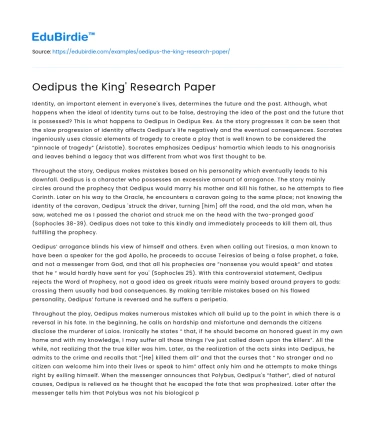Identity, an important element in everyone's lives, determines the future and the past. Although, what happens when the ideal of Identity turns out to be false, destroying the idea of the past and the future that is possessed? This is what happens to Oedipus in Oedipus Rex. As the story progresses it can be seen that the slow progression of identity affects Oedipus’s life negatively and the eventual consequences. Socrates ingeniously uses classic elements of tragedy to create a play that is well known to be considered the “pinnacle of tragedy” (Aristotle). Socrates emphasizes Oedipus’ hamartia which leads to his anagnorisis and leaves behind a legacy that was different from what was first thought to be.
Throughout the story, Oedipus makes mistakes based on his personality which eventually leads to his downfall. Oedipus is a character who possesses an excessive amount of arrogance. The story mainly circles around the prophecy that Oedipus would marry his mother and kill his father, so he attempts to flee Corinth. Later on his way to the Oracle, he encounters a caravan going to the same place; not knowing the identity of the caravan, Oedipus 'struck the driver, turning [him] off the road, and the old man, when he saw, watched me as I passed the chariot and struck me on the head with the two-pronged goad' (Sophocles 38-39). Oedipus does not take to this kindly and immediately proceeds to kill them all, thus fulfilling the prophecy.
Save your time!
We can take care of your essay
- Proper editing and formatting
- Free revision, title page, and bibliography
- Flexible prices and money-back guarantee
Oedipus’ arrogance blinds his view of himself and others. Even when calling out Tiresias, a man known to have been a speaker for the god Apollo, he proceeds to accuse Teiresias of being a false prophet, a fake, and not a messenger from God, and that all his prophecies are ”nonsense you would speak” and states that he “ would hardly have sent for you' (Sophocles 25). With this controversial statement, Oedipus rejects the Word of Prophecy, not a good idea as greek rituals were mainly based around prayers to gods: crossing them usually had bad consequences. By making terrible mistakes based on his flawed personality, Oedipus’ fortune is reversed and he suffers a peripetia.
Throughout the play, Oedipus makes numerous mistakes which all build up to the point in which there is a reversal in his fate. In the beginning, he calls on hardship and misfortune and demands the citizens disclose the murderer of Laios. Ironically he states “ that, if he should become an honored guest in my own home and with my knowledge, I may suffer all those things I’ve just called down upon the killers”. All the while, not realizing that the true killer was him. Later, as the realization of the acts sinks into Oedipus, he admits to the crime and recalls that “[He] killed them all” and that the curses that “ No stranger and no citizen can welcome him into their lives or speak to him” affect only him and he attempts to make things right by exiling himself. When the messenger announces that Polybus, Oedipus's “father”, died of natural causes, Oedipus is relieved as he thought that he escaped the fate that was prophesized. Later after the messenger tells him that Polybus was not his biological parent. Oedipus is so determined to learn of his parentage that he ignores the warnings and attempts of others to stop him until he learns the truth of what he has done. But by then his world crashes around him as the truth about Laois and Jocasta surfaces.
The play begins with Oedipus being thought of as the hero of Thebes. Even being considered the “child of golden Hope” (190). After experiencing so much praise Oedipus considers that
Throughout the story, we see the Public boost Oedipus's ego which results in Oedipus being arrogant and leading him to mistakes that affect his legacy and leading him to consider the entire population of Thebes as “ [His] children, a latest-generation born from Cadmus” (1). As the story reaches the end and the truth is revealed, we see the population of Thebes thinks that Oedipus is “Better to be dead than alive and blind”. Oedipus’ legacy slowly changes as the truth is revealed
Oedipus makes many mistakes affected by both his personality and the compliments given to him by the population which leads him to have a change in his perception. But after the truth is revealed, Oedipus takes dramatic action and stabs out his eyes to prevent his arrogance from blinding him.






 Stuck on your essay?
Stuck on your essay?

